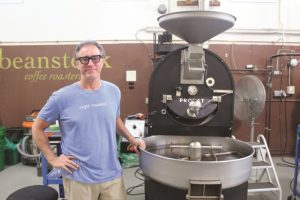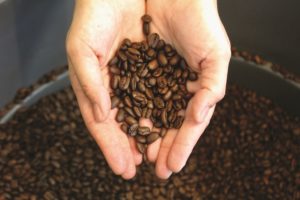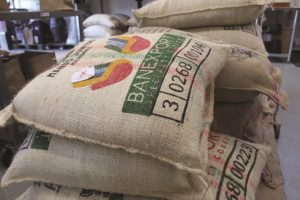EASTHAM — John Simonian starts every day with a good cup of coffee. Then he goes to work making coffee for the rest of us. He’s not a barista. He’s the Outer Cape’s only coffee roaster.
Beanstock Coffee was founded in 1996 by Kyle Oliver and Polly Moryl. It was a small coffee shop in its early days, brewing cups at the old Duck Creeke Inn in Wellfleet. When Simonian joined the company in 2000, they were putting out batches of beans using a one-pound roaster.
A couple of years later, the founders stepped away, and Simonian’s friend Jonathan Kelly moved to the Cape from California to help. Simonian and Kelly set out to focus on wholesaling and began roasting coffee in a “tiny little shed” next to Olivers’ Red Clay Tennis Courts.

The two went door to door to ask retailers to try their roast. “It was pure fun and love of coffee” that made things work, says Simonian. As Beanstock began to pick up accounts across the Cape, the company outgrew its highway-side space and moved, first to a spot on Brackett Road in Eastham, then, in 2010, to the current warehouse on Holmes Road.
Paul Messina joined Beanstock when the company first moved, and Kelly has since left. But Simonian is still at it, his passion for coffee as strong as ever.
Matt Wong arrives early each morning to get the company’s two large roasting machines — a Probat that can handle 15 pounds of beans and a 25-pound-capacity Mill City — warmed up. This takes about an hour, as roasting temperatures range from 420 to 450 degrees Fahrenheit, depending on the beans and the blend, says Simonian.
“If you want more body in a coffee, you are going to stretch out the middle section of the roast — the Maillard section,” Simonian says. “You can taste it in the end result.”

During the first stage of roasting, the heat removes all the humidity from still-green coffee beans. Next comes the browning stage — during which the Maillard reaction affects the carbohydrates and amino acids in the beans. It produces large molecules called melanoidins, which turn the beans brown and also contribute to mouthfeel and body. Coffee that has spent longer in the Maillard reaction can seem pleasantly viscous. But timing is everything, because the acids that produce fruity and sweet notes are destroyed if the coffee remains in the Maillard reaction for too long. The coffee beans begin to “pop” at the end of this stage, and aromas develop, determining the intensity of the roast’s flavor.
“If I think about the way we roasted back in the day,” says Simonian, “it’s unbelievable. We would watch temperatures and write them down by hand.” Now he uses software to manage everything from roast times to inventory with precision. At the end of each roast, he analyzes a range of data. Without the software, “I had no idea what I was missing,” Simonian says.
In the summer, Beanstock roasts every day. In the slower winter months, Fridays are generally reserved for cuppings and sample roastings, but for now those are woven into the busy weekly schedule whenever Simonian is able to step away from the roasters.
When new crops of coffee beans come in, importers send raw samples. Beanstock has a special roaster for these minuscule batches, which are brewed and taste-tested a day or two later, Simonian says. The tasting is called “cupping” in coffee parlance. It involves pouring hot water directly onto coffee grounds, letting them steep, then stirring, sniffing deeply, and slurping the coffee across your taste buds. The goal is to note the coffee’s body or mouthfeel, its acidity level, sweetness, and other flavor notes.

Beanstock sells 30 different blends, many with hometown names like Black Fish Creek or Shucker’s Blend. But there’s more to being a good roaster than finding the right flavor profiles, Simonian says. There is a certain level of social awareness in this business that Simonian describes as a “coffee industry bond.”
For Simonian, sustainable practices are a focus and a source of pride. Beanstock is an organic and fair trade-certified company and works with four main U.S.-based importers to sustainably source its beans. The company also recycles all of the bags that its beans are shipped in, through a special program with GrainPro, the bag maker.
Today, Beanstock ships its coffee wholesale to over 80 accounts on Cape Cod and in Rhode Island, New York, New Hampshire, and California, Simonian says.
“When I first got into this, I never thought, ‘Man, the numbers are going to be great here,’ ” says Simonian. “I just thought, it would be great to bring really good coffee to Cape Cod.”
